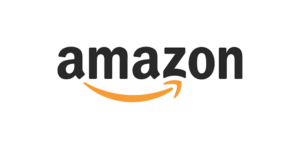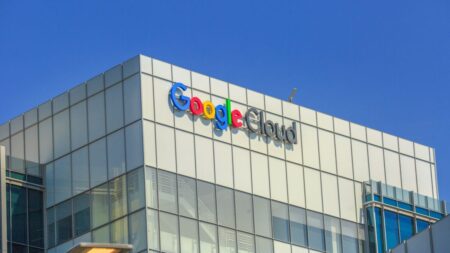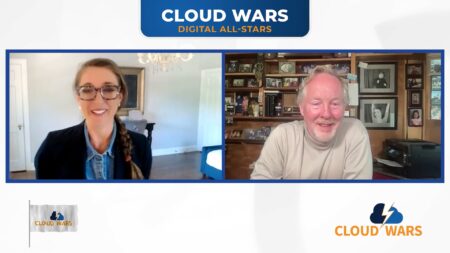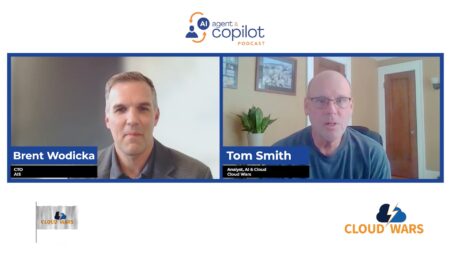As cloud computing becomes the dominant platform for digital business in 2020 and beyond, the world’s six most-influential cloud vendors will engage in three separate and intense competitive tech battles in 2020. Each has huge implications for the vendors’ business customers.
These high-stakes clashes will impact hundreds of thousands of businesses across the globe, as the battles center around the hottest topics in enterprise IT: machine learning, hybrid computing, modern SaaS applications, and cloud databases.
And while the Cloud Wars will continue across all segments of the business-technology landscape in 2020 and beyond, I’ve put together some thoughts on the three specific battles with the greatest strategic importance for business customers in the coming year. Namely:
- AI, ML, and hybrid cloud: Microsoft (#1 on my Cloud Wars Top 10) versus Google Cloud (#6 on the Top 10);
- Modern SaaS applications: #3 Salesforce versus #4 SAP; and
- Cloud-native databases: #2 Amazon versus #5 Oracle.
Cloud Wars
Top 10 Rankings — Dec. 2, 2019
| 1. Microsoft — Major IaaS deal w/#3 Salesforce follows Q1 cloud revenue of $11.6B |
| 2. Amazon — Can’t be happy about Salesforce moving Marketing Cloud to Azure IaaS |
| 3. Salesforce — Big Dreamforce dreams: How Benioff Plans To Defeat Oracle and SAP |
| 4. SAP — New co-CEOs unify priorities, push customer success |
| 5. Oracle — Ellison and SAP both claim #1 spot in enterprise apps—which will it be? |
| 6. Google — No Q3 cloud revenue details, but “significant growth” across the globe |
| 7. IBM — Q3 cloud rev. up 14% to $5B; BofA says cloud has saved billions in IT costs |
| 8. Workday — Exclusive: Aneel Bhusri is Workday’s “Pied Piper of Machine Learning” |
| 9. ServiceNow — Bill McDermott takes over as CEO as Q3 revenue reaches $900M |
| 10. Accenture — No longer breaking out cloud revenue but probably close to $10B |
There will no doubt be other hotly contested market segments in 2020. For example, the inroads that both Microsoft and Google are making in challenging Amazon for the top spot in public-cloud IaaS. But these three are the ones to watch. Because the outcomes have such sweeping implications for business customers in every industry and in every region of the world.
So let’s take a look, to get a sense of how fierce competition might play out in 2020.
1. AI, ML, and Hybrid Cloud: Microsoft versus Google.
In a classic matchup of true heavyweights, two of the world’s biggest, most-profitable, and most highly valued companies are making staggering investments in powerful technologies that will impact every facet of our lives for decades to come.
Recent efforts from both Microsoft and Google—into AI in general and highly disruptive machine learning (ML) in particular—come with far-reaching implications. Some thoughts to consider:
- Technology aside, which company is offering a more-thoughtful approach around the cornerstone issues of privacy and trust? Which is giving business customers the more-credible reassurance that “your data remains your data”?
- Which can leverage the power of ML most effectively in big-data analytics? While Google Cloud has made some huge strides in turning its BigQuery technology into a fast-growing analytics solution, Microsoft recently claimed that its Azure Synapse analytics service is crushing BigQuery in benchmark-performance tests. (For more on that head-to-head comparison, please see Microsoft Torches Google and Amazon on Big-Data Benchmarks, Says Microsoft.) So—which will carry the day with business customers?
- Microsoft’s got more experience in and longer commitment to hybrid computing than anyone else in the Cloud Wars Top 10. But Google’s launch of its Anthos platform has generated enormous interest among business customers and shows great promise for helping Google Cloud be viewed as a top-tier cloud partner with a wide range of essential capabilities.
- As this plays out, bear in mind a very big number that not only Google Cloud but every competitor of Microsoft must acknowledge: I’ve estimated that for its fiscal year ending June 30, 2020, Microsoft will generate cloud revenue of $50 billion. (See Microsoft’s $50-Billion Moonshot: #1 Cloud Vendor Lays Out New Growth Plans.) So in order for Google Cloud to grab the leadership position from Microsoft in either ML or hybrid cloud, it will have to be not only as good as Microsoft, but indeed much, much better. Does scale matter? In the cloud, it surely does: #1 Microsoft Cloud Revenue as Big as Salesforce, SAP, Oracle, IBM Combined.
- That said, I believe Google Cloud could well be the most dangerous competitor Microsoft is facing. It alone has the deep-tech expertise, market credibility, and financial resources equal to those of Microsoft. (See Can Google Cloud Beat Microsoft? Could Salesforce + IBM? Or Amazon + SAP?)
2. Modern SaaS Applications: #3 Salesforce versus #4 SAP.
Talk about a world-class buyer’s market for business customers! In one corner we have the company that invented the enterprise-applications business—SAP—and that remains today the largest such vendor in the world. And in the other corner, we have the high-growth disruptor—Salesforce—that’s now projecting that by the time 2024 rolls around, its annual revenue will be an astonishing $35 billion. (See How Salesforce Plans to Defeat Oracle and SAP While Scaling to $35B.)
It’s ironic—or is it?—that a month before Salesforce co-CEO Marc Benioff released that $35-billion target for its fiscal year 2024 ending Jan. 31, 2024, SAP disclosed at its own Capital Markets Day that it will end the year 2023 with total revenue of—drum roll, please—$35 billion.
As those two excellent companies race toward that future with shared goals but very different assets and approaches toward getting there, the biggest battleground will be in the CRM category. Salesforce is throwing everything into its Customer 360 strategy. Meanwhile, SAP is taking what I believe is a truly game-changing approach via its acquisition of Qualtrics and its reorientation around the Experience Management platform. (See Salesforce vs. SAP: Who Will Lead the Customer-Experience Revolution? and Attention Salesforce: SAP CX Revenue Surges 75%, Key Exec Jumps Ship.) Some questions:
- Salesforce has simply been so focused, so successful and so innovative in the CRM space for so long that it will be difficult for any company—even one as capable as SAP—to displace it. Does SAP have the will and the goods to do so?
- Will the Qualtrics acquisition and the development of the Experience Management across not just CRM but also HCM and ERP give SAP enough oomph to become a serious rival to Salesforce?
- Will the backward-looking categories I just mentioned—CRM, HCM and ERP—that represent an entirely different way of doing business remain credible in the digital age? If they don’t, will Salesforce’s total focus on CRM become a drag?
- Can SAP’s new co-CEOs, Jennifer Morgan and Christian Klein, rapidly and forcefully orient the company around not just meeting but indeed transcending the goals and objectives of former CEO Bill McDermott?
- Will Salesforce’s sideways expansions into new subcategories such as Employee Experience and Manufacturing Cloud push it into new areas that blunt some of the competitive advantages SAP holds outside of CRM? (See SAP Says HCM Is Dead—Can Qualtrics Transform it to HXM?)
3. Cloud-Native Databases: Category King Oracle Versus Wannabe Disruptor Amazon.
For many years—about 20, to be exact—Amazon ran its booming business on the Oracle Database, by far the dominant enterprise database in the world. But as the competitive battles between Amazon and Oracle became more intense in recent years, and as Amazon decided it wanted to become a big-time database player, Amazon decided to rip and replace its Oracle databases and run on its own data-management technologies. It has indeed done that, which is a remarkable feat. But will it be a Pyrhhic victory for Amazon and AWS?
Maybe this week at AWS’s big ReInvent conference, we’ll hear some news about other big corporations following the move away from Oracle and onto AWS databases. But so far, I have not heard of a single company doing that on an end-to-end basis. Salesforce had a chance to do so last month at its own Dreamforce mega-event, but did not. (See Will Salesforce Dump Oracle and Pick AWS? An Insider’s Perspective.) The big question is, will others? To blunt the likelihood of such a possibility, Oracle founder Larry Ellison recently did the unthinkable and forged a cloud partnership with Microsoft. As the saying goes, the enemy of my enemy is my friend. (See Oracle Will Leapfrog Amazon and Get Closer with Microsoft, Larry Ellison Says.)
As great a success as AWS has been, if it thought it was tough to compete with the traditional Oracle Database, just wait until it has to outperform the Oracle Autonomous Database. You know, the one that Ellison says will be the company’s most-successful product ever. (See Hello, IBM and Microsoft: Larry Ellison’s Big Plans for Oracle Autonomous Database.) Hell’s bells, the autonomous achievement by Ellison and Oracle is so far-reaching that not even mighty Microsoft has chosen to try the autonomous thing. (At least not yet. See Microsoft Versus Oracle on Autonomous Databases: Microsoft’s Approach.) And you could make a very good argument that Microsoft’s experience with enterprise databases and related technologies is significantly deeper and broader than that of AWS.
Closing Thoughts
These three competitive battles will have far-reaching implications. And not only for the cloud vendors involved, but their customers as well. But however the head-to-head confrontations turn out, business customers will benefit most from these Cloud Wars clashes.
Disclosure: at the time of this writing, Microsoft, SAP, Oracle and Google Cloud were clients of Evans Strategic Communications LLC and/or Cloud Wars Media LLC.
Subscribe to the Cloud Wars Newsletter for in-depth analysis of the major cloud vendors from the perspective of business customers. It’s free, it’s exclusive, and it’s great!









